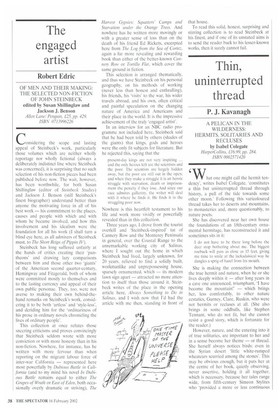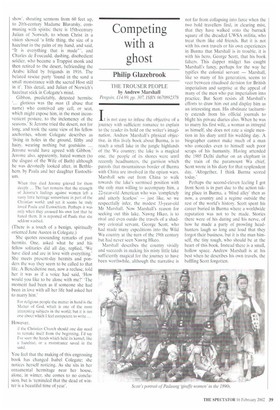Thin, uninterrupted thread
P. J. Kavanagh
A PELICAN IN THE WILDERNESS: HERMITS, SOLITARIES AND RECLUSES by Isabel Colegate HarperCollins. £16.99, pp. 284, ISBN 0002571420 What one might call the hermit tendency', writes Isabel Colegate, 'constitutes a thin but uninterrupted thread through history, a pull of the tide towards some other moon.' Following this varicoloured thread takes her to deserts and mountains, to monasteries and, more questionably, to nature poets.
She has discovered near her own house the foundations of an 18th-century ornamental hermitage, has reconstructed it and sometimes sits in it:
I do not have to be there long before the deer stop bothering about me. The biggest roebuck will pass as close as 15 feet, giving me time to smile at the lackadaisical way he dangles a sprig of hazel from his mouth.
She is making the connection between the true hermit and nature, when he or she lives deeply within it — after long years in a cave one announced, triumphant, 'I have become the mountain!' — which brings her, less comfortably, to other nature ecstatics, Gurney, Clare, Ruskin, who were not hermits or recluses at all. (She also brings in some oddballs, like Stephen Tennant, who do not fit, but she cannot resist a good story, which is fortunate for the reader.) However, nature, and the entering into it of true solitaries, are important to her and in a sense become her theme — or thread. She herself always notices birds: even in the Syrian desert 'little white-rumped wheatears scurried among the stones'. This may be obvious enough, but it puts her at the centre of her book, quietly observing, never assertive, holding it all together, which is necessary, because her tales range wide, from fifth-century Simeon Stylites who 'provided a more or less continuous
show'. shouting sermons from 60 feet up, to 20th-century Madame Blavatsky, communing with spirits; there is 15th-century Julian of Norwich, to whom Christ in a vision showed 'a little thing, the size of a hazelnut in the palm of my hand, and said, "It is everything that is made" ', and Charles de Foucauld, dashing, disobedient soldier, who became a Trappist monk and then retired to the desert, befriending the Arabs; killed by brigands in 1916. The belated rescue party 'found in the sand a small monstrance with the sacred Host still in it'. This detail, and Julian of Norwich's hazelnut stick in Colegate's mind.
Gibbon, predictably, detested hermits: glorious was the man (I abuse that name) who contrived any cell, or seat, which might expose him, in the most inconvenient posture, to the inclemency of the seasons.' St Jerome tried the desert, not for long, and took the same view of his fellow anchorites, whom Colegate describes as 'living in holes in the ground, filthy and hairy, wearing nothing but goatskins ... Jerome would have agreed with Gibbon.' Jerome also, apparently, hated women (to the disgust of the Wife of Bath) although he was devotedly looked after, in Bethlehem, by Paula and her daughter EustochiUrn.
When they died Jerome grieved for them deeply ... The fact remains that the strength of Jerome's feelings against women left a nasty little heritage somewhere in part of the Christian world; and yet it seems he truly loved Paula and Eustochium. Perhaps it was only when they aroused his own lust that he hated them. It is reported of Paula that she seldom washed.
(There is a touch of a benign, spiritually oriented Jane Austen in Colegate.)
She quotes resounding remarks of past hermits. One, asked what he and his fellow solitaries did all day, replied, 'We have died and are in love with everything.' She meets present-day hermits and ponders the way they seem to be called to that life. A Benedictine nun, now a recluse, told her it was as if a voice had said, 'How would you like to be alone with me?' The moment had been as if someone she had been in love with all her life had asked her to marry him:
For religious people the matter in hand is the Matter of God, which is onc of the most interesting subjects in the world; but it is not one about which I feel competent to write ...
However,
if the Christian Church should one day need to remake itself from the beginning, I'd say I've seen the hands which held its kernel, like a hazelnut, or a monstrance saved in the sand.
You feel that the making of this engrossing book has changed Isabel Colegate; she notices herself noticing. As she sits in her ornamental hermitage near her house, alone, in winter, she comes to no conclusion, but is 'reminded that the dead of winter is a beautiful time of year'.





































































 Previous page
Previous page